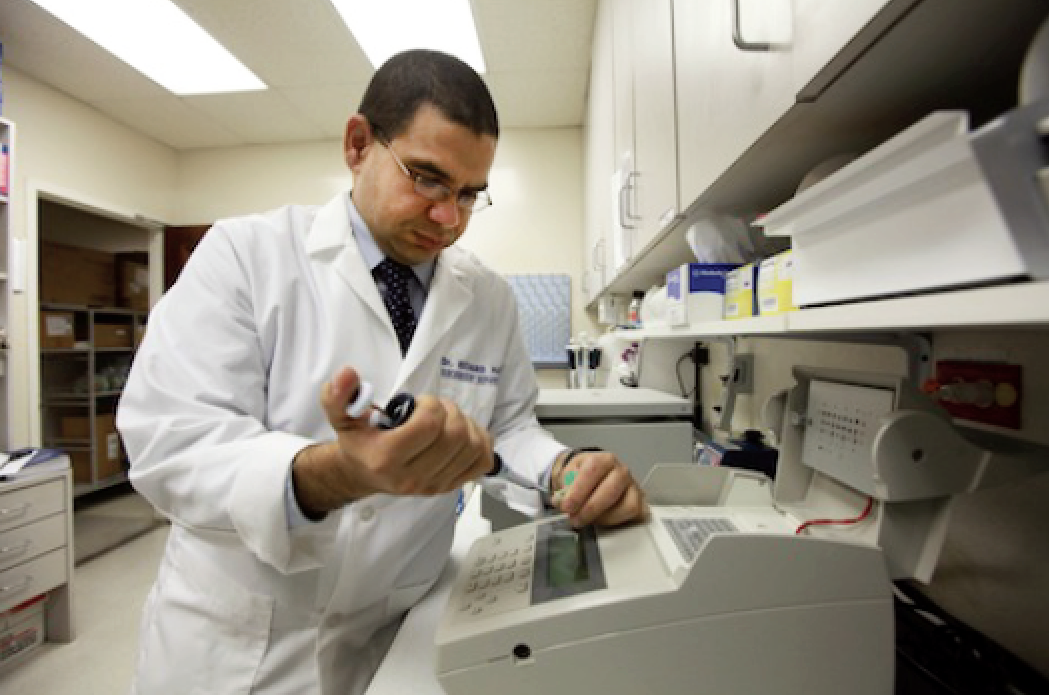Luis Cubano: Colonel & Doctor
Former Puerto Rico Wing Commander Holds Natl. Institutes of Health Post
Russell Slater
Contributing Writer
Col. Luis Cubano is one of the assistant inspectors general, or IGs, for the Southeast Region, and he has worked to continually improve and expand cadet programs and opportunities while holding various positions in Civil Air Patrol.
Outside of the organization, the former professor, who holds a Ph.D. in biology, now administers diversity-focused institutional research training grants for the National Institutes of Health in Bethesda, Maryland. He manages the Research Initiative for Scientific Enhancement program and also the Maximizing Access to Research Careers Undergraduate Student Training in Academic Research program.
Interested in Science and Aviation
Cubano joined CAP’s Puerto Rico Wing in September 1989 because he “was interested in science and aviation,” he recalls. He has also been a member of the Louisiana, Kansas and Alabama wings, and he’s been a squadron, group and wing commander along with other various staff positions.
“As a cadet I participated in the three missions of CAP — aerospace education, emergency services and cadet programs,” Cubano recalled. “Every day I use the communications, leadership and organizational skills that I learned as a cadet.” During his t me as a cadet he also obtained the Gen. Billy Mitchell Award.“
Unique Mentorship
Lt. Col. Charlotte Payne Wright remembers Cubano when he first attended the St. George Composite Squadron in uptown New Orleans as a mature student from Tulane University.
“Luis had been a cadet in Puerto Rico Wing,” Wright said. Cubano brought to the newly formed squadron credentials as a first aid instructor and offered fellow members an easy opportunity to complete first aid training. “The training exceeded the requirements for certification and became something that we all appreciated. His thinking extended into our safety attitudes and thinking.
“A recently turned senior member, Luis was probably my youngest senior member. He worked well with the cadets. He also fit well into Louisiana Wing procedures, some of which must have been new to someone with sole experience as a Puerto Rico Wing member. He was a constant presence and positive example to the cadets. Most valuable to me, he was a team player within the squadron.
“His accessibility to cadets and his mentorship was unique to him and a gift to us all. This was a bonus that we had not expected.”
Significant Improvements
After Cubano took command of the Puerto Rico Wing in 2012, a position he held until 2014, he oversaw significant improvements.
“As a wing commander I paid equal attention to the three missions,” Cubano said. “We organized free summer  encampments for the cadets, had a former astronaut speak at a wing conference and increased the number of emergency services personnel in the wing.”
encampments for the cadets, had a former astronaut speak at a wing conference and increased the number of emergency services personnel in the wing.”
Under Cubano’s leadership the wing accomplished the first save in its history and had the largest cadet membership increase in the Southeast Region. Elevated goals for recruiting and retention were set once a strong public awareness campaign was launched, which included community service projects and local school visits.
The wing also created an Introductory Flight Academy, as part of the aerospace education mission, and conducted its first Legislative Day, in which cadets got a chance to mingle with the island’s elected representatives. Also, the number of cadet orientation flights increased significantly. Cubano’s emphasis on the importance of educating cadets inspired 77 senior members to enroll in the Training Leaders of Cadets program.
After securing funding, the wing established the Puerto Rico Endowment and began offering free summer encampments for cadets in 2013. Also that year, the wing held the Region Cadet Leadership School and established a cadet honor society.
Leading by Example
Cubano, a former Southeast Region chief of staff, was recognized as the Emergency Services Officer of the Year for the Louisiana Wing in 1993, the Senior Member of the Year of the Louisiana Wing in 2001 and also Senior Member of the Year for the Puerto Rico Wing in 2011.
In addition to his exemplary service and important work furnished to the scientific community, he was also involved with six space shuttle missions, including astronaut John Glenn’s return to space in 1998, as well as a pair of science experiments conducted aboard the International Space Station. Academically,, he earned a bacjhelor's degree in cellular and molecular biology from Tulane University, a master's in biology from the University of Alabama in Huntsville and a Ph.D. in biology from Kansas State University, followed by postdoctral research at Tulane University Medical School.
As an assistant professor (2002-2006), associate professor (2006-2013) and professor (2013-2016) at Universidad Central del Caribe in Bayamón, Puerto Rico, Cubano performed research in cellular and molecular biology and taught courses in cell biology, cancer molecular biology and other subjects to medical and graduate students.
He mentored students, postdoctoral fellows and junior faculty and helped obtain funds to train them. He organized the Molecular Biology Summer Academy (2013, 2014, 2015, 2016), the Neurophysiology Workshop (2014, 2015) and the Bioinformatics Institute (2014).
Cubano serves as an excellent example to cadets who wish to apply their energies and efforts to the field of science. Still involved in the cadet program, Cubano continues to support cadets in their endeavors, because “it provides me with the opportunity to support the next generations of leaders of CAP and the nation.”
Wright fondly recalled the moment she learned of Cubano’s ascension to wing commander, “I had left Louisiana for Virginia in 1999. I later learned that Luis returned to Puerto Rico and had been appointed wing commander — my first former member to reach this command office.
"Luis does Puerto Wing proud.”




